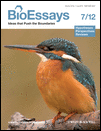
BIOESSAYS
Scope & Guideline
Exploring the Nuances of Molecular Biology
Introduction
Aims and Scopes
- Interdisciplinary Biological Research:
The journal publishes articles that bridge various disciplines within biology, including molecular biology, genetics, cell biology, ecology, and evolutionary biology. - Mechanisms of Disease and Health:
A significant focus is on understanding the biological mechanisms underlying diseases, including cancer, neurodegenerative disorders, and infectious diseases, emphasizing translational research. - Environmental and Ecological Interactions:
Research addressing the interactions between biological organisms and their environments, including studies on microbiomes, ecological impacts, and evolutionary adaptations. - Regulatory Mechanisms in Development:
The journal also covers the molecular and genetic regulation of development, focusing on stem cells, differentiation, and tissue regeneration. - Emerging Technologies and Methodologies:
BioEssays highlights advancements in research methodologies, including CRISPR technology, bioinformatics, and computational biology, showcasing their applications in biological research.
Trending and Emerging
- Microbiome Research:
There is a growing emphasis on the role of microbiomes in health and disease, highlighting their impact on human health, environmental sustainability, and ecological interactions. - Systems Biology and Integrative Approaches:
Increasingly, research articles focus on systems biology, integrating data across molecular, cellular, and organismal levels to understand complex biological phenomena. - Translational Medicine and Therapeutics:
The trend towards translational research is evident, with a focus on how basic biological discoveries can be applied to develop new therapies and medical technologies. - Genomic and Epigenomic Regulation:
Research on the regulation of gene expression through epigenetic mechanisms is gaining traction, with implications for development, aging, and disease. - Artificial Intelligence in Biology:
Emerging applications of AI and machine learning in biological research are becoming a significant focus, particularly in areas like bioinformatics, drug discovery, and predictive modeling.
Declining or Waning
- Traditional Genetics:
Research papers focused solely on classical genetics and Mendelian inheritance have seen a decrease, indicating a shift towards more complex and integrative approaches involving genomics and epigenetics. - Single-Species Studies:
There is a noticeable reduction in studies that focus exclusively on single-species analysis, as the trend shifts towards more holistic approaches that consider multi-species interactions and ecological dynamics. - Basic Biochemical Studies:
While basic biochemistry remains essential, papers that do not connect biochemical findings to broader biological implications or translational applications are less frequently published.
Similar Journals

Biologia Futura
Elevating Knowledge in Biochemistry and BeyondBiologia Futura, an esteemed journal published by SPRINGER HEIDELBERG, serves as a vital platform for researchers and professionals in the fields of Agricultural and Biological Sciences, as well as Biochemistry, Genetics, and Molecular Biology. Established in Hungary, this journal has been at the forefront of scientific inquiry since its inception in 2019 and continues to contribute significantly to advancing knowledge through rigorous peer-reviewed articles. With current rankings placing it in the second quartile for Agricultural and Biological Sciences and third quartile for Biochemistry, Genetics, and Molecular Biology according to Scopus metrics, it reflects a robust academic quality and reach. Scholars are encouraged to share their original research, reviews, and innovations that intersect these dynamic fields. Although not an open access publication, Biologia Futura ensures wide dissemination of high-impact research from its notable address at Tiergartenstraße 17, D-69121 Heidelberg, Germany, aiming to foster collaboration and discovery within the global scientific community.

BIOLOGY BULLETIN
Connecting Scholars to the Heart of Biological Discoveries.BIOLOGY BULLETIN is a prominent academic journal published by PLEIADES PUBLISHING INC, dedicated to advancing the fields of Agricultural and Biological Sciences as well as Biochemistry, Genetics, and Molecular Biology. With an ISSN of 1062-3590 and E-ISSN of 1608-3059, the journal has been a vital resource for researchers and professionals since its commencement in 1996. Located in the United States, BIOLOGY BULLETIN operates within a highly competitive academic landscape, achieving a 2023 ranking in the Q3 quartile for Agricultural and Biological Sciences and Q4 for Biochemistry, Genetics, and Molecular Biology, highlighting its commitment to delivering impactful research despite its challenges. Researchers seeking to publish their findings will find a platform for significant insights, as reflected in its Scopus rankings, where it stands at #183 and #199 out of 221 in its respective categories, showcasing opportunities for growth and visibility. While currently not an open-access publication, BIOLOGY BULLETIN plays a crucial role in facilitating scholarly communication and fostering an understanding of biological sciences, making it an essential read for academics, professionals, and students alike.

JOURNAL OF BIOSCIENCES
Championing Impactful Discoveries in Life SciencesJOURNAL OF BIOSCIENCES, published by the Indian Academy of Sciences, has established itself as a pioneering platform in the fields of biosciences, encompassing diverse research areas such as agricultural and biological sciences, biochemistry, genetics, molecular biology, and medicine. With an impressive trajectory since its inception in 1979, the journal has achieved notable recognition, securing a Q1 ranking in Agricultural and Biological Sciences and maintaining its place in the top quartiles for Biochemistry and Medicine as of 2023. With Scopus rankings placing it at #32 in General Agricultural and Biological Sciences and #65 in General Biochemistry, Genetics, and Molecular Biology, the journal reaches the 85th and 70th percentiles respectively, reflecting its impact and relevance in current scientific discourse. Although it does not offer open access, the JOURNAL OF BIOSCIENCES remains crucial for researchers, professionals, and students dedicated to advancing knowledge and innovation within the biosciences, providing a vibrant forum for high-quality research and comprehensive reviews.

Biology-Basel
Fostering Collaboration in Cutting-edge Biological DiscoveriesBiology-Basel is a premier, peer-reviewed open-access journal published by MDPI since 2012, situated in the heart of Switzerland. With an E-ISSN of 2079-7737, this journal serves as a vital platform for the dissemination of innovative research across the broad spectrum of Agricultural and Biological Sciences, Biochemistry, Genetics, Molecular Biology, and Immunology. Recognized for its rigorous editorial standards and impactful findings, it currently ranks Q1 in Agricultural and Biological Sciences and holds impressive positions in several categories according to the 2023 Scopus rankings. The journal’s open-access model ensures that high-quality research is freely available to a global audience, fostering collaboration and knowledge sharing among researchers, professionals, and students alike. Spanning from 2012 to 2024, Biology-Basel is committed to reflecting the latest advancements in biological sciences, making it an essential resource in the ever-evolving landscape of biological research.

Frontiers in Bioscience-Landmark
Elevating Knowledge in Biochemistry and BeyondFrontiers in Bioscience-Landmark is a prestigious journal published by IMR PRESS that focuses on a diverse array of topics within the fields of biochemistry, genetics, molecular biology, immunology, and microbiology. With the ISSN 2768-6701 and E-ISSN 2768-6698, this journal has carved a significant niche since its inception in 1996, making its mark in contributions to the scientific community all the way through to 2024. Having achieved a respectable Q2 cohort rank in multiple categories, including biochemistry and immunology, it stands out for its impactful research, evidenced by its current Scopus rankings which highlight it as a vital resource for ongoing studies and advancements in the biosciences. Despite not being open access, the journal ensures that readers have access to high-quality research articles that are peer-reviewed and designed to foster academic discourse. The importance of Frontiers in Bioscience-Landmark lies in its commitment to disseminating innovative findings that can significantly enhance our understanding of biological sciences, making it an essential read for researchers, professionals, and students alike.

Biology Direct is a leading open-access journal published by BMC, dedicated to disseminating groundbreaking research in the fields of biological sciences. Since its inception in 2006, the journal has emerged as a pivotal platform for scholars, researchers, and practitioners, providing unrestricted access to high-quality, peer-reviewed articles that cover a wide spectrum of topics, including biochemistry, ecology, and applied mathematics. With an impressive ranking in the first quartile across multiple scientific categories, including Agricultural and Biological Sciences and Biochemistry, Genetics, and Molecular Biology, Biology Direct is recognized for its rigorous standards and impactful contributions within the academic community. The journal's open-access model ensures that research findings reach a global audience, fostering collaboration and innovation. Researchers and students looking to stay ahead in the rapidly evolving biological sciences will find Biology Direct an invaluable resource for knowledge and insight.

FOLIA BIOLOGICA-KRAKOW
Exploring the frontiers of biochemistry and genetics.FOLIA BIOLOGICA-KRAKOW, published by the renowned Polish Academy of Sciences, Institute of Systematics and Evolution of Animals, serves as a pivotal platform for advancing research in the fields of Biochemistry, Genetics, and Molecular Biology. Since its inception in 1953, this journal has consistently contributed to the academic dialogue, focusing on a diverse range of topics, including evolutionary biology, molecular genetics, and ecological biochemistry. Although currently classified in Q4 quartiles according to the 2023 categorizations in both Biochemistry, Genetics and Molecular Biology (miscellaneous) and Medicine (miscellaneous), its dedicated efforts to disseminate critical findings and foster scholarly exchange ensure its relevance and growth in the scientific community. FOLIA BIOLOGICA-KRAKOW is not Open Access, but researchers can access its publications through institutional subscriptions or library services, making it a valuable resource for scientists seeking to enrich their understanding of biological processes. With its commitment to excellence and innovation in biological research, this journal remains an essential reference for researchers, professionals, and students alike, contributing significantly to the evolution of contemporary biological sciences.

DNA AND CELL BIOLOGY
Connecting Researchers to the Heart of BiologyDNA AND CELL BIOLOGY, published by Mary Ann Liebert, Inc, is a distinguished journal in the realms of cell biology, genetics, and molecular biology, holding a notable position in its Q3 and Q2 quartile rankings across multiple academic categories as of 2023. With an ISSN of 1044-5498 and an E-ISSN of 1557-7430, this journal has been a pivotal platform for the dissemination of cutting-edge research since its inception in 1990, extending its coverage through 2024. Situated in the United States, the journal offers high-quality peer-reviewed articles, exploring significant advancements in biological sciences while fostering interdisciplinary collaborations within the research community. Though it currently does not offer open access, subscribed institutions and individual readers benefit from its rich repository of knowledge. The journal's rigorous standards and impactful content make it an essential resource for researchers, professionals, and students alike, aiming to stay at the forefront of discoveries influencing DNA and cellular dynamics.

IUBMB LIFE
Unlocking Innovations in Molecular BiologyIUBMB LIFE is a prestigious, peer-reviewed journal published by WILEY, dedicated to advancing the fields of biochemistry, molecular biology, and cell biology. With an impressive impact factor and consistently ranked in the Q1 and Q2 categories across multiple relevant disciplines—including Biochemistry, Genetics, and Clinical Biochemistry—this journal has established itself as a leading platform for disseminating innovative research and critical reviews that propel scientific discovery. The journal spans a converged publication period from 1999 to 2024, providing comprehensive insights into the dynamic landscape of biochemical research. Researchers, professionals, and students alike are invited to explore its Open Access options, ensuring that groundbreaking studies are accessible to a global audience. As it continues to shape the future of life sciences, IUBMB LIFE remains a vital resource for those seeking to enrich their understanding and contribute to these rapidly evolving fields.

Cells
Illuminating the World of Cells Through Groundbreaking ResearchCells, published by MDPI in Switzerland, is a leading open-access journal that has been disseminating groundbreaking research in the fields of Biochemistry, Genetics, and Molecular Biology since its inception in 2011. With an impressive E-ISSN of 2073-4409, the journal boasts a strong impact factor and ranks in the 84th percentile for Scopus ratings, underscoring its significance in advancing scientific knowledge. As a Q1-ranked journal in both 2023 and 2020, it serves as a premier platform for researchers, professionals, and students eager to explore innovative findings and methodologies. By providing unrestricted access to high-quality research, Cells plays a pivotal role in facilitating collaboration and inspiration within the global scientific community, making it an indispensable resource for anyone interested in cutting-edge discoveries in cellular biology.